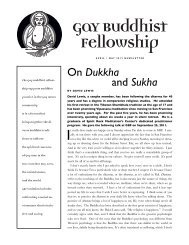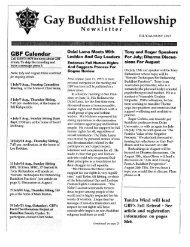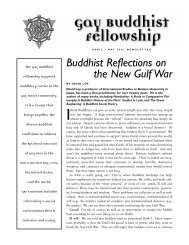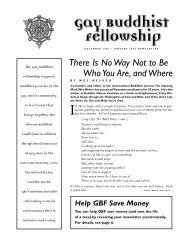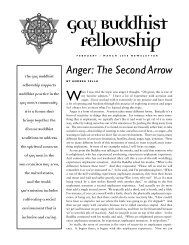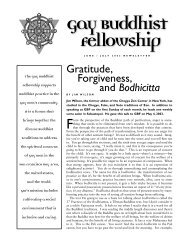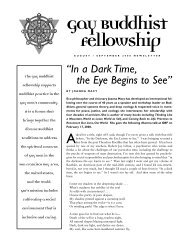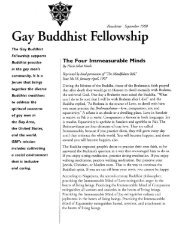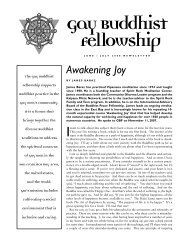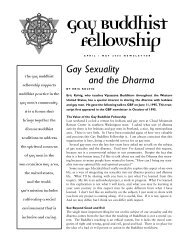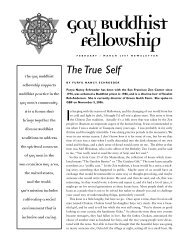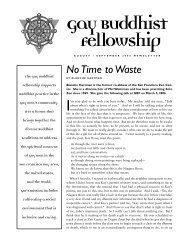These Are Our Siblings - Gay Buddhist Fellowship
These Are Our Siblings - Gay Buddhist Fellowship
These Are Our Siblings - Gay Buddhist Fellowship
Create successful ePaper yourself
Turn your PDF publications into a flip-book with our unique Google optimized e-Paper software.
DECEMBER 2010 / JANUARY 2011 NEWSLETTER<br />
The <strong>Gay</strong> <strong>Buddhist</strong><br />
<strong>Fellowship</strong> supports<br />
<strong>Buddhist</strong> practice in the<br />
<strong>Gay</strong> men’s community.<br />
It is a forum that<br />
brings together the<br />
diverse <strong>Buddhist</strong><br />
traditions to address<br />
the spiritual concerns<br />
of <strong>Gay</strong> men in the<br />
San Francisco Bay <strong>Are</strong>a,<br />
the United States,<br />
and the world.<br />
GBF’s mission includes<br />
cultivating a social<br />
environment that is<br />
inclusive and caring.<br />
“<strong>These</strong> <strong>Are</strong> <strong>Our</strong> <strong>Siblings</strong>”:<br />
Helping International<br />
LGBT Refugees<br />
BY NEIL GRUNGRAS<br />
Neil Grungras is the founder and executive director of ORAM, Organization<br />
for Refuge, Asylum and Migration. ORAM is a San Franciscobased<br />
nonprofit providing international and domestic advocacy, education<br />
and representation of LGBTQ refugees. In addition to directly assisting<br />
refugees who have escaped countries such as Iran, ORAM works<br />
closely with the UN High Commissioner for Refugees, the US Department<br />
of State, and several community groups to establish consciousness<br />
and international protection standards for these vulnerable refugees.<br />
Neil spoke at GBF on August 22, 2010.<br />
It’s really wonderful to be here. I really cherish the opportunity to talk to you about<br />
what we do and about what you might be able to do to help a brother you don’t<br />
know yet or a sister you don’t know yet.<br />
A little bit about our organization: ORAM, which stands for Organization for Refuge,<br />
Asylum and Migration, took on this little task of assisting LGBT refugees. I formed<br />
ORAM three years ago, and we became active about two years ago. I formed ORAM in<br />
response to what I saw as the abandonment of LGBT refugees by the mainstream refugee<br />
assistance community worldwide. It seemed to me, after doing refugee law for 25 years,<br />
that I was never hearing about LGBT refugees. I was seeing some in my own law practice<br />
in San Francisco and in doing international refugee work later at NGOs, but the subject<br />
never came up openly. It was in the closet. And I started to think, “You know, it’s really<br />
strange. I’m seeing case after case after case and yet there’s no literature about this. We<br />
know what the statistics are worldwide; we know what the condition is of LGBTs worldwide.<br />
People are escaping, and they’re going somewhere, and why isn’t anyone talking<br />
about this? Why isn’t our own community doing anything about it, about this phenomenon,<br />
about the people?” And I started to dig a bit deeper, and then put the picture together.<br />
There are 75 countries in the world which criminalize same-sex consenting relations,<br />
75 countries. There are an additional twenty or so countries that don’t criminalize<br />
same-sex relations but where you can get imprisoned or you can get killed or your family<br />
can do what is called "honor kill” you for being gay or lesbian or trans, and where the police<br />
will not protect you at all. I think that’s most of the countries in the world. The picture<br />
that I started to put together was that the people who were escaping this persecution<br />
probably outnumbered every other kind of refugee in the world. Most refugees are identified<br />
by their nationality or by their faith or by their political opinion, but these refugees go
across every national border, across every faith, across every political<br />
opinion. It’s five to ten percent of the human population that’s<br />
persecuted in more than half of the countries in the world. That’s<br />
the reality of being LGBT around the world.<br />
What happens to these people? Most of them never escape; most<br />
of them never get to leave their homes. Most of them live in the<br />
closet, in hiding, and the ones who don’t succeed in hiding are<br />
found out and imprisoned or killed. Many, many, many are sexually<br />
abused. (I’ll talk about that in a little while.) But a very small percentage<br />
have the fortitude to actually get up and help themselves<br />
and cross a national border and go try to get protection somewhere<br />
else or try to move somewhere else. The vast majority don’t have<br />
the inner strength to do it. When they reach that country of transit,<br />
their struggle begins. And now we’re talking about a very small<br />
percentage, those five to ten percent of the five to ten percent who<br />
have the wherewithal to cross a national border and try to get<br />
somewhere safe. And you would think that that is the end of the<br />
saga, right? That’s where the movie would end. You’d see the credits.<br />
That’s really just the beginning of their saga because most<br />
countries that they escape to share cultures, values, hatreds, whatever<br />
it is, with the countries that they’ve come from. The way cultures<br />
work, they spread across international borders, and most of<br />
our clients escape from a country where things are really bad and<br />
enter another country where things are maybe just as bad, sometimes<br />
a little bit better in some ways, sometimes a little bit worse in<br />
other ways. I’ll give you an example in a while about Iran and Turkey,<br />
which is where ORAM has a project on the ground right now.<br />
It was our first project. I want to give you some real examples.<br />
So let’s put this in a bit of a broader perspective before we get too<br />
deep into the life of one refugee. There are ten million refugees in the<br />
world today, ten million people who have run away from one country<br />
and entered into another one. <strong>These</strong> are very approximate numbers,<br />
obviously. And those are refugees who have run away because they’ve<br />
been persecuted because of their race, religion, nationality, political<br />
opinion or because of their membership in a social group, which is<br />
oftentimes being LGBT. There are today about 150 million forced<br />
migrants in the world. That’s people who have crossed international<br />
boundaries because of wars, because of mass persecution, because of<br />
terrorism, or more and more because of climate change. That number<br />
is expected to rise to over a billion in the next ten to twenty years, so<br />
that the world that we’re looking at today is very, very different from the<br />
world we’ll be looking at in ten to twenty years. It’s going to be a world<br />
of mass migrations, of people crossing borders for water or to escape<br />
hunger. It’s already happening, but we don’t see it here as clearly as it’s<br />
seen in the rest of the world. What’s the part of LGBTs in this? Well,<br />
whenever you have situations of crisis or situations of not enough, those<br />
who are marginalized have even less than the others. Those who are<br />
marginalized don’t have the connections to get the basic necessities that<br />
others are getting. We’re already seeing that with regard to LGBTs, and<br />
you’ll see even more as these mass population flows continue.<br />
So where is this happening? The largest pockets of persecution<br />
today of LGBTs are the Middle East and Africa. When we started<br />
ORAM two years ago, virtually all of the stories we’d heard would<br />
have been in the Middle East. This is actually one of the most disturbing<br />
things I’m here to tell you today. You know about conditions<br />
in Iran. Most of you know that the death penalty applies to<br />
homosexuality in seven countries. Six of those are in the Middle<br />
East. One of them is Nigeria, where the death penalty applies in<br />
the North, where Sharia governs. And that situation is bad enough<br />
It seemed to me, after doing refugee law for 25 years, that I was never<br />
hearing about LGBT refugees. I was seeing some in my own law practice<br />
in San Francisco and in doing refugee work with international<br />
NGOs, but the subject never came up openly. It was in the closet.<br />
2 G B F D E C E M B E R 2 0 1 0 / J A N U A R Y 2 0 1 1 N E W S L E T T E R<br />
because in most of the Middle East, even the countries that don’t<br />
criminalize homosexuality, you are very likely to get killed by your<br />
family or by neighbors if it’s found out that you are LGBT. In the<br />
last two years, a completely new phenomenon has arisen, new in<br />
terms of media: mass persecution of LGBTs in Africa. Most of<br />
you have heard about what’s happening in Uganda; you’ve heard<br />
about the case in Malawi; you’ve heard about cases in Rwanda and<br />
Burundi and Kenya. As the conflict between East and West, between<br />
the perceived colonizers and the native populations, sharpens,<br />
the battle lines form on the backs of whom? On the backs of homosexuals<br />
because in many of these places in the Middle East as in<br />
Africa, homosexuality is perceived to be a Western phenomenon<br />
being imposed on the clean, ethical native cultures by the evil Westerners,<br />
and the concept of living openly as a homosexual is unknown<br />
in any of these places, as Ahmadinejad told you a couple of<br />
years ago. And let me tell you, he knew what he was talking about.<br />
He knows that there are lots of gays in Iran. He knows that there<br />
are gay parties in Iran, but he also knows that living openly as a<br />
homosexual is forbidden and is punishable by the death penalty, and<br />
that’s what he was saying, that there’s no homosexuality, that we<br />
don’t have that phenomenon in Iran. He didn’t mean that people<br />
don’t want to be with people of the same sex. He meant that you<br />
could be killed for being with people of the same sex, and that’s the<br />
reality in most places. So what’s happening in Africa is that as people<br />
are daring to come out of the closet, all of the rage of many,<br />
many years against colonialism, the hatred and the anger that built<br />
up, is being focused on the few gays that have the nerve or the daring<br />
to come out of the closet and demand the right to live as who<br />
they are. Those people are paying with their lives very often. So<br />
we’re seeing a shift now from a condition in which the Middle East<br />
was the most virulent place for gays and lesbians and transgenders<br />
to one in which Africa is becoming that place.<br />
In the Middle East, things haven’t been quiet either. How many<br />
of you have heard about what’s happening in Iraq to gays? It’s<br />
been in the media just a bit here but not too much. About 700 gays<br />
have been killed in Iraq in the last few years. With the American<br />
occupation, it became safe for gays in Iraq to begin coming out of<br />
the closet in the safe areas of Baghdad and the Green Zone, and the<br />
phenomenon of homosexuality has come out of the closet. Of<br />
course, these very same people were gay and lesbian all their lives,<br />
but now they’re able to be a tiny bit more open or to seek each
other’s company, and what’s happening is that paramilitary groups,<br />
police, and private civilians are targeting these people. They are<br />
usually tortured. There’s a very popular method that’s being used<br />
to execute gays. If they’re not hanged, typically what happens is<br />
that super glue is injected into the anus and then the person is<br />
forced fed diuretics until the stomach explodes. And the streets are<br />
strewn with these people who have been caught. A few weeks ago<br />
one of the safe houses of a group of gays in Iraq was found by the<br />
police. Five of the men disappeared completely. One of the men<br />
was found in the hospital with his throat slashed, and the house was<br />
burned down. That’s the level of hatred. Let’s not misunderstand:<br />
this is not just homophobia; this is caustic blend of homophobia<br />
and xenophobia and hatred of the American occupation that’s all<br />
being directed at the gays. Very few of these people manage to<br />
escape. And when they do, they get to a place like Syria or Lebanon<br />
or Jordan. This is what I was talking about before. <strong>These</strong> countries<br />
share cultures with Iraq to an extent, and being out of the<br />
closet is absolutely impossible in these countries. You can be beaten<br />
up and killed in Jordan or Syria just like you can be in Iraq, and<br />
some of our clients come from those countries, in fact.<br />
So people live in hiding over there. Many of them are afraid to<br />
come out of the closet even to the authorities, and this is where our<br />
activity kicks in. They live in hiding, and sometimes they live in<br />
hiding for the rest of their lives. Sometimes their lives are not very<br />
long. Sometimes they’re caught by the authorities in these countries<br />
and kicked back home. Most of them are so deeply ashamed of<br />
who they are. I think homophobia is ultimately the biggest enemy, if<br />
you have to prioritize your enemies. Maybe people are so ashamed<br />
of who they are that they will not come out even if their life depends<br />
on it. One of my first cases was a gay man from Afghanistan<br />
on the Turkish-Iranian border. He had applied for refugee status<br />
with the United Nations High Commissioner for Refugees, and it<br />
did not occur to him for a second that he could tell anybody in a<br />
position of authority that he was a homosexual because in the place<br />
that he comes from, you can easily be killed for being homosexual,<br />
and you would never tell anybody that in Afghanistan. His father<br />
had tried to kill him, and that’s why he had escaped from home. He<br />
had been living in Turkey for four years when he applied for refugee<br />
status based on political opinion, which was a lie. He had never<br />
been persecuted for his political opinion. The UN Human Rights<br />
Commission found out that he was lying, which is very easy to do in<br />
an interview, and he was denied. After he was denied, he was kept<br />
for three years, waiting for his case to be appealed, and finally when<br />
he found us, it was the first time he had talked to someone face-toface<br />
who said, “I understood about being gay. We’re gay too, and<br />
we can help you.” We took his case through the United Nations<br />
High Commissioner for Refugees, but he would have never done<br />
that had someone not reached out to him and said, “It’s okay; we’re<br />
here for you,” because there is no symbol whatsoever at the UN<br />
headquarters that it’s okay to be gay. The people who adjudicate<br />
these cases are often very homophobic.<br />
In Turkey, refugees aren’t allowed to work. Refugees are required<br />
to live in small towns. This is all refugees. If you have family or if<br />
you have compatriots or if you have co-religionists, you can somehow<br />
make your way through those years of struggle to get out, but if<br />
you’re LGBT, you are targeted by that very community, so the last<br />
people he was going to look for were other Afghanis because they<br />
would have killed him themselves. He was all by himself, and he<br />
had to survive, and he did what many of our clients do: he sold his<br />
body; that’s all he had. In Turkey, a trick will get you a meal. It<br />
wasn’t once a day. It was three times a day that he would have to<br />
turn tricks. When he felt safe enough with me, I asked him, “<strong>Are</strong><br />
you having safe sex? <strong>Are</strong> you watching out for yourself ?” And he<br />
answered, "What are you talking about? Not even once. You can’t<br />
get condoms here, and even if you could, the johns wouldn’t agree<br />
to use the condoms." So do the math. He’d been doing sex trade<br />
for three years, three times a day, unprotected. What are the<br />
chances that he’s going to eventually be safe somewhere and healthy<br />
somewhere? So this young man has gone from childhood sexual<br />
abuse, to abuse by elders, to threats of being killed by his family, to<br />
sex trade, and maybe he’ll get to safety and maybe he just won’t,<br />
and that is the reality of most of our people around the world.<br />
That’s when I decided to leave my cushy job in an international<br />
organization and to form ORAM. And I found out that the very<br />
organizations that were supposed to be helping these people were<br />
really not helping them. I went to the US Refugee Corps director,<br />
whom I’d worked with for many years, a very nice woman who I<br />
don’t think is homophobic, and I said to her, "Why don’t we have<br />
many gay refugees around here? The US accepts 80,000 refugees a<br />
year. Why don’t I hear about any programs to assist LGBT refugees?<br />
<strong>These</strong> are the most persecuted people.” And she said, "We<br />
have nothing against them; it’s just that they’re not coming forward<br />
for help. If somebody actually comes into the office and says, ‘I’m<br />
<strong>These</strong> are our siblings; that’s what we’re trying to drive home<br />
everywhere. It’s not them and us; this could easily be us. We’re trying<br />
to inculcate an understanding in the international LGBT community,<br />
first of all, that this is our responsibility because no one is going<br />
to take care of ours unless we take care of ours.<br />
gay and I’m being persecuted; can you help me?’ we’ll help them.<br />
But nobody has done that, or very few people have done that.”<br />
I went one step back because those cases get to the US through<br />
the UN system. So I started to talk to people in the UN system and<br />
asked, “What is going on here?” It’s easy to ask this question when<br />
you’re over 50 and have been working with people for a really long<br />
time. They take you a little more seriously. And the people in the<br />
UN told me the same thing. They said, “We actually have nothing<br />
against them. We are actually working on the first guidance ever<br />
dealing with LGBT refugees, and that’s going to come out really<br />
soon. If someone comes out to us, we’ll consider giving them refugee<br />
status. But nobody does that." So I went one step further back<br />
to the NGOs that help the refugees, and there are a thousand<br />
GBF DECEMBER 2010 / JANUARY 2011 NEWSLETTER 3
NGOs around the world which are charged with assisting refugees.<br />
And I got the same story. You go into these waiting rooms, and you<br />
understand exactly why it’s impossible for most people to come out.<br />
<strong>Our</strong> clients go and speak to people who are from the place they’re<br />
being interviewed in, people who share the culture of the place,<br />
who often exhibit the very same prejudices that everybody else does.<br />
When they go in, they fill out forms that have no indication whatsoever<br />
that it’s safe to be LGBT. Many of our clients are harassed by<br />
other refugees in the waiting room while they’re waiting to be interviewed<br />
if they are a bit effeminate or if there’s any sign whatsoever.<br />
Of course, in the cities where they’re living, they often are harassed<br />
in their home. Stones are thrown through the windows. In Turkey,<br />
in many cities, our clients are afraid to go out in the day because<br />
they can be beaten up. They wait until nighttime. They’re thrown<br />
out of stores; they’re thrown out of shopping centers, and on and<br />
on and on. And that’s the way they struggle to survive day to day.<br />
So at ORAM, we developed a strategy to change all this, to educate the<br />
international community, and to educate LGBTs around the world about<br />
what’s happening to our siblings. <strong>These</strong> are our siblings; that’s what we’re<br />
trying to drive home everywhere. It’s not them and us; this could easily<br />
be us. We’re trying to inculcate an understanding in the international<br />
LGBT community, first of all, that this is our responsibility because no<br />
one is going to take care of ours unless we take care of ours. But beyond<br />
that, we also want to educate governments, to educate international institutions,<br />
and to assist individual refugees so that at least some of them can<br />
get to safety. In Turkey, we have about forty clients right now. Almost all<br />
of them are from Iran. As you probably know, Iran has executed 4,000<br />
LGBTs since the Islamic Revolution in ‘78 and ‘79. Nobody knows the<br />
exact numbers because they’re not published, and most people would<br />
rather be executed as a thief than as a homosexual for the sake of the<br />
family, so you often don’t really know the reason why people are being<br />
executed. Most of our clients don’t want to leave Iran. Very few do.<br />
What happens is that they typically hold on. They stay at home, and they<br />
try to stay in hiding as long as possible, until a neighbor finds out, or until<br />
the police find out, or a party they’re at is raided, and at that point they<br />
have 24 hours to pack and get out. Most of our clients don’t have money,<br />
so what most of them do is get on a bus and cross into Turkey, which is<br />
the only country that Iranians can go to without a visa, and they wait<br />
there to get somewhere else that’s safe. This phenomenon is repeated in<br />
many parts of the world. Then they get to Turkey, and they find out<br />
they’ll be living in a tiny little town which is hyper-conservative, which is<br />
very homophobic. <strong>Our</strong> clients tell us that they encounter a lot more<br />
homophobia in Turkey as a practical matter than they did in Iran, because<br />
Iranians won’t beat you up on the streets, but Turks will. So it’s a<br />
new kind of reality, and it’s a new kind of fear. We work with clients<br />
sometimes for a year and a half, sometimes for two years, getting through<br />
4 G B F D E C E M B E R 2 0 1 0 / J A N U A R Y 2 0 1 1 N E W S L E T T E R<br />
the UN system, fighting the UN system. Eventually almost each one of<br />
them gets to safety, but it’s a very time-consuming, labor-intensive, frustrating<br />
process that requires a tremendous amount of attention and a<br />
tremendous amount of compassion. Sometimes you just want to shake<br />
your clients and say, “Come on, get it together; you’re just going to have<br />
to say this to the officer or else you’re not going to get refugee status.” I<br />
can’t tell you the number of people that I have told before their interview,<br />
Here in the United States, the refugee system is built on family unification.<br />
. . . If you’ve got family, you’ve got a place to live, someone<br />
who loves you, someone to say, “You’re okay; you’re a worthwhile<br />
human being, and you are worthy of survival.” But our clients don’t<br />
have that type of preparation in life. <strong>Our</strong> clients heard from age<br />
zero that their fate is worse than that of a cockroach.<br />
“You have to say that you’re a homosexual, and I know that it’s the worst<br />
thing in the world for you, but you’re going to have to say that because<br />
your life depends on it.” Most of them do; some of them don’t.<br />
I don’t want to depress you too much. At the end of the saga,<br />
those who are resettled, those who get through the UN process,<br />
are lucky enough to be among the one percent who get international<br />
resettlement slots. Does everybody know what resettlement<br />
is? It’s when a country accepts you as a refugee from outside, so<br />
you’re sitting in country X, and country Y accepts you as a refugee<br />
voluntarily. The US accepts most of the refugees in the world,<br />
80,000 a year right now. Those who arrive in the home country<br />
think, “Okay, phew! It’s almost over.” The screen goes down; the<br />
credits come up. Wrong! Now reality starts. Your client arrives in<br />
Canada, Australia, the US, Sweden—whichever country took<br />
them, that’s where they can go. And once they arrive, this is the<br />
reality: they don’t know the language; they often don’t have a<br />
profession; they’re all by themselves; their own faith community or<br />
language community rejects them, and they would never approach<br />
them in any case. We’ve had several Palestinian clients who were<br />
settled in Scandinavia and who were given housing among other<br />
Palestinians and were beaten up by those other refugees. Again,<br />
they’re afraid to tell the social worker, even in Sweden. Can you<br />
imagine being afraid to tell a social worker in Sweden? It’s about<br />
internalized homophobia. And they struggle to somehow make it.<br />
Most of them do make it, but the reality is really tough. Here in<br />
the United States, the refugee system is built on family unification;<br />
that’s how the vast majority of the 80,000 refugees a year that are<br />
integrated into the US make it. What happens is their own family<br />
or their own community sponsors them; they’re brought into their<br />
own church (usually) and then are given the support to make it.<br />
<strong>These</strong> people take them to the Social Security office, to the doctor,<br />
and to English class. Federal assistance here is eight months long.<br />
After eight months, you’re cut off from all federal assistance, including<br />
medical assistance. So there’s not a lot of time to make it.<br />
It’s pretty tough even if you have family here. If you’ve got family,<br />
you’ve got a place to live, someone who loves you, someone to say,<br />
“You’re okay; you’re a worthwhile human being, and you are worthy<br />
of survival.” But our clients don’t have that type of preparation<br />
in life. <strong>Our</strong> clients heard from age zero that their fate is worse
than that of a cockroach. They’ve been told over and over again<br />
that they don’t deserve to survive, that they are a source of shame<br />
to their families and their cultures, and they don’t need to live.<br />
They carry that with them. They’ve also been denied education.<br />
They were afraid to go to school because they were afraid to be<br />
beaten up in school. They were cut off from financial systems;<br />
they were cut off from their families; and then they arrive here<br />
and they have nothing. <strong>Our</strong> Muslim Iranian queer arrives in San<br />
Antonio, Texas, and goes into the offices of the Catholic Charities—I’m<br />
not making this up—and has got to deal with "Who am I?<br />
Who are these people? How am I possibly going to make it? Who<br />
am I going to tell who I am?" We have found that after coming to<br />
the US our clients very often become homeless pretty soon because<br />
federal funding is $2,000 for eight months, and they don’t<br />
know the language and can’t get a job. So we started a project<br />
recently to bring clients to the San Francisco area, and we found a<br />
resettlement agency, one organization in the whole country that<br />
agreed to resettle our clients, and they will start arriving at the<br />
end of this year or the beginning of next year. I’ve been speaking<br />
to a lot of groups, not asking for money although we love<br />
financial support, but because we the community need to be that<br />
family that these people don’t have. When they start arriving<br />
(and there aren’t going to be many), there need to be people here<br />
who have the compassion to reach out and to say, "I’ll be the<br />
person to take you to the doctor,” or “We have a room in our<br />
house; I’ll rent you a room so you can have a safe place, so you<br />
can have a place you can belong to so you don’t have to walk the<br />
streets.” We need to start building support within our community.<br />
That means each of you. I couldn’t ask anything more of<br />
you than that when you leave here today, you talk to some people<br />
you know about what’s happening. We need to act like family.<br />
We need to start being family because we don’t have any other<br />
family and to take care of our own.<br />
Perhaps Jack and Aurelio can talk about their experience with their<br />
refugees, who are in Turkey, and explain to you what their life is like.<br />
Jack Busby: I just wanted to say a little bit about two things.<br />
I’m the reason that Neil is here today. I heard him on our local<br />
gay radio show on KALW late last year and found the story so<br />
compelling. And talk about suffering! Which is a significant part<br />
of the <strong>Buddhist</strong> understanding of the world, and one of our<br />
charges is to reduce suffering. This is such a direct application of<br />
that. So I got in touch with your organization, and that’s kind of<br />
the <strong>Buddhist</strong> angle on this thing. And ORAM has set up a program<br />
where you can adopt a refugee, and so we did adopt two,<br />
one from Iran and one from Kazakhstan, both of whom had<br />
already escaped to Turkey. So we’ve followed them, and we’ve<br />
had some correspondence with them. It’s just two guys, and one<br />
guy so far is out. But if I were that guy, that would be important.<br />
My reaction is, “There but for the grace of God—or Buddha—<br />
would I be in the same situation.” It just seems incumbent to try<br />
to do something. So we adopted these two guys, and we’re just<br />
thrilled that last week one of them was relocated to Australia—in<br />
Melbourne. Last week, we had a Skype conversation with this<br />
kid. He’s a 27-year-old graphic designer who spent two years in<br />
Turkey. And now he’s starting this new, completely different<br />
cultural life in Melbourne. The other, I guess, is still having<br />
some problems getting out. That’s essentially it. I’m all in support<br />
of our gay issues here in America—gay marriage and gays<br />
in the military and all that, which is important, and since supposedly<br />
we are cultural leaders, those issues are important, but<br />
for these guys over there, it’s a literal matter of life and death,<br />
and so I thought this was Buddhism in action.<br />
Aurelio Font: And there is much that you can do beyond the<br />
adopting. As Neil pointed out, these people are going to need contacts;<br />
these people are going to need resources to point them in the<br />
direction of gainful employment; they’re going to need a roof over<br />
their head; they’re going to need somebody to orient them in the<br />
various cities to which they are eventually assigned, and given the<br />
powers that we have with the global connection to other people<br />
through social networking, we really do have a hand in creating an<br />
environment that will be welcoming of these refugees.<br />
Jack Busby: Actually, Aurelio is a big Facebook guy, and he got this<br />
guy, Hamid, in touch with a Facebook friend in Melbourne, and so<br />
that’s where he’s staying.<br />
Aurelio Font: He’s got a roof over his head, a free place to stay,<br />
two really sweet guys who are taking him under their wings—we call<br />
them gay uncles. Hamid refers to us—and it’s quite moving—in<br />
some of the correspondence that we’ve had, he refers to us as his<br />
dads, and in the course of correspondence, I said, “Think of us as<br />
We the community need to be that family that these people don’t<br />
have. When they start arriving, there need to be people here who<br />
have the compassion to reach out and to say, "I’ll be the person to<br />
take you to the doctor,” or “We have a room in our house; I’ll rent<br />
you a room so you can have a safe place, so you can have a place you<br />
can belong to so you don’t have to walk the streets.”<br />
uncles,” and he said, “No, parents give life, and you have given me a<br />
new life. You are my father.” That’s very, very, very powerful. We<br />
haven’t done that much; we’ve just given a few hundred dollars for<br />
each, and did the best that we could to make the connections with<br />
responsible people who would follow them and do their part to ensure<br />
that they are well taken care of and acclimated to the various<br />
societies that they are going to be in. And it can be done, and it can<br />
be done easily. I think that the important question for all of us to<br />
ask is, “What can we as individuals do? And what can we do collectively?”<br />
If one person doesn’t have the beaucoup bucks to throw in<br />
the direction of ORAM, then several of you can get together. Share<br />
the cost. Share a child. Share a son. Share a daughter. You can do<br />
that. It’s not that difficult.”<br />
GBF DECEMBER 2010 / JANUARY 2011 NEWSLETTER 5
GBF<br />
Steering Committee<br />
Ray Dyer<br />
Clint Seiter<br />
Marvin Snow<br />
Jim Stewart<br />
Carl Wolf<br />
Treasurer<br />
Teng-How Bae<br />
SUNDAY SITTINGS<br />
Program Committee<br />
Baruch Golden<br />
Jerry Jones<br />
Shantanu Phukan<br />
Jim Stewart<br />
Speaker Coordinator<br />
Baruch Golden<br />
Facilitator Coordinator<br />
Ray Dyerß<br />
Facilitators<br />
Tom Bruein<br />
Peter Fitzpatrick<br />
Joe Goode<br />
Roy King<br />
David Lewis<br />
Host Coordinator<br />
Kei Matsuda<br />
Hosts<br />
Richard Azzolini<br />
Cass Brayton<br />
Jay Corbett<br />
Mark Hoffheimer<br />
Tage Lilja<br />
Dave Limcaco<br />
Kei Matsuda<br />
Tony Pasqua<br />
Paul Shepard<br />
NEWSLETTER<br />
Editor<br />
Michael Langdon<br />
Transcribers<br />
Michael Altshule<br />
Gary Ost<br />
Tony Pasqua<br />
Jim Stewart<br />
Design / Layout<br />
Michael Gabel<br />
Mailing List<br />
Bill Hurley<br />
Marvin Snow<br />
Newsletter Mailing<br />
Jack Busby<br />
MAIL<br />
Richard Azzolini<br />
LARKIN STREET<br />
YOUTH CENTER<br />
Volunteer Coordinators<br />
Clint Seiter<br />
PRISON OUTREACH<br />
Coordinator<br />
Baruch Golden<br />
WEBSITE<br />
Joe Kukulka<br />
YAHOO GROUP MODERATOR<br />
George Hubbard<br />
SOUND / RECORDINGS<br />
George Hubbard<br />
RETREAT COORDINATOR<br />
Michael Murphy<br />
How You Can Help ORAM<br />
ORAM is a non-profit organization dedicated to helping asylum seekers and refugees<br />
worldwide who have been forced to flee their home countries due to persecution<br />
based on their sexual orientation, gender or gender identity. It is based in the United<br />
States but has projects in the UK, Turkey and the Middle East. ORAM relies mainly<br />
on voluntary donations from trusts, foundations and individuals.<br />
Campaign with ORAM: You can help ORAM make positive and lasting<br />
changes to the way LGBTI asylum seekers and refugees are treated. Spread the word<br />
about what is happening. Invite ORAM to speak at your functions. Tell your friends<br />
about ORAM. Sign up for its e-newsletter. Link to its website from yours!<br />
Donate: Help ORAM continue its vital work. Make a donation. Commit to<br />
longer term giving if you can—check out ORAM’s Adopt-a-Refugee program.<br />
Fundraise: Help ORAM raise money for the vital work that it does. Hold<br />
an event in your city, town or neighborhood. Organize a collection for ORAM<br />
at your place of worship, community group or workplace. Invite ORAM to<br />
speak at your event.<br />
Volunteer: Become an ORAM volunteer or intern.<br />
Email volunteer@oraminternational.org<br />
For more information, please visit www.oraminternational.org<br />
or email info@oraminternational.org.<br />
How to Reach Us<br />
www.gaybuddhist.org<br />
For general questions about GBF write to:<br />
inquiry@gaybuddhist.org<br />
To contact Program Committee with suggestions for speakers and comments:<br />
gaybuddhist.org/programs<br />
Mail correspondence:<br />
GBF<br />
PMB 456<br />
2215-R MARKET STREET<br />
SAN FRANCISCO CA 94114<br />
Address changes or to subscribe or unsubscribe to the newsletter:<br />
www.mailinglist@gaybuddhist.org<br />
GBF Newsletter. Send submissions to:<br />
editor@gaybuddhist.org<br />
GBF Yahoo Discussion Group<br />
There is now a GBF discussion group for the general membership (and others) on<br />
Yahoo. Join the discussion at:<br />
www.groups.yahoo.com/group/gaybuddhistfellowship<br />
6 GBF DECEMBER 2010 / JANUARY 2011 NEWSLETTER
Calendar<br />
Sunday Sittings<br />
10:30 am to 12 noon<br />
Every Sunday at 10:30am we meditate together for 30 minutes,<br />
followed by a talk or discussion till 12 noon. Everyone is then welcome<br />
to stay and socialize over refreshments till approxi- mately<br />
12:30, after which those who are interested usually go somewhere<br />
local for lunch. <strong>Our</strong> sittings are held at the San Francisco <strong>Buddhist</strong><br />
Center, 37 Bartlett Street. (Look for the red door near 21st St<br />
between Mission and Valencia Streets). MUNI: 14 Mission or 49<br />
Van Ness-Mission, alight at 21st St, walk 1/2 block. BART: 24th<br />
and Mission, walk 31/2 blocks. PARKING: on street (meters free<br />
on Sundays) or in adjacent New Mission Bartlett Garage. The Center<br />
is handicapped accessible.<br />
Sunday Speakers<br />
December 5 th <br />
Pauletta Chanco<br />
Pauletta M. Chanco is a long-time student and practitioner of<br />
meditation in the Theravada <strong>Buddhist</strong> tradition. She was recently<br />
nominated to the Community Dharma Leadership Program<br />
at Spirit Rock Meditation Center in Woodacre and hopes<br />
to begin this in 2012. She has taught beginning and ongoing<br />
meditation classes at Alameda Yoga Station since 2007. She is a<br />
mother of three children aged 13, 15 and 29. Pauletta is also a<br />
professional fine artist whose abstract paintings are inspired by<br />
her meditation and spiritual practice.<br />
December 12 th <br />
Tom Moon<br />
Tom Moon has been a practitioner of Vipassana meditation for<br />
fifteen years, and his spiritual home is Spirit Rock Meditation<br />
Center. He is a psychotherapist in San Francisco, and works<br />
primarily with gay men. His chief professional commitment is in<br />
exploring the interface between <strong>Buddhist</strong> practice and psychotherapy<br />
practice.<br />
December 19 th <br />
Jennifer Berezan<br />
Jennifer Berezan is a unique blend of singer/songwriter, teacher,<br />
and activist. Over the course of eight albums, she has developed<br />
and explored recurring themes with a rare wisdom. Her lifelong<br />
involvement in environmental, women’s, and other justice<br />
movements, as well as an interest in Buddhism and earth-based<br />
spirituality, is at the heart of her writing. She teaches at the<br />
California Institute of Integral Studies in the department of<br />
Philosophy and Religion. Her on-going class (since 1997) is entitled<br />
“the Healing Ecstasy of Sound” and explores music as a<br />
spiritual practice from a wide range of cross cultural, traditional<br />
and contemporary perspectives.<br />
January 2 nd <br />
Tom Faupl<br />
Thomas Faupl is a licensed psychotherapist in private practice<br />
in San Francisco. He was a Diamond Heart student for several<br />
years before returning to Buddhism as his primary spiritual<br />
path. For the past nine years, Thomas has been a student of<br />
Tenzin Wangyal Rinpoche, one of the first lamas to bring the<br />
Bon Dzogchen teachings of Tibet to the West. Thomas has a<br />
particular interest in the interface between the complementary<br />
practices of <strong>Buddhist</strong> meditation and psychotherapy.<br />
January 9 th <br />
Heather Sundberg<br />
Heather Sundberg began teaching meditation in 1999 primarily<br />
to youth and families. She has completed the four-year Spirit<br />
Rock/Insight Meditation Society Teacher Training and continues<br />
to be mentored by Jack Kornfield. She is also a graduate of the<br />
Spirit Rock Community Dharma Leaders program (CDL2). She<br />
held the position of Spirit Rock Family Program Teacher & Manager<br />
from 2001-2010. Currently she teaches classes, daylongs<br />
and retreats throughout California, especially at Spirit Rock, and<br />
through the Mountain Stream Meditation Center community.<br />
She brings to her teaching a passion for the depth of retreat<br />
practice, combined with a playful creativity for integrating the<br />
teachings into daily life.<br />
January 16 th <br />
John Mifsud<br />
John Mifsud has studied insight meditation for over nine years<br />
and recently completed the East Bay Meditation Center’s<br />
Commit to Dharma Program led by Larry Yang. He is currently<br />
in the Community Dharma Leaders Training Program at Spirit<br />
Rock. He is a lead facilitator of the EBMC Deep Refuge Affinity<br />
Group for Men of Color and their Euro-Descent allies. He also<br />
studied with Rodney Smith at Seattle Insight Meditation for<br />
eight years. John was also the Coordinator of the Seattle Multicultural<br />
Sangha and spent ten years on the Leadership Team of<br />
Seattle Dharma Buddies, a meditation group for GBT men.<br />
January 23 rd <br />
Anne Diedrich<br />
Anne Diedrich has been practicing vipassana meditation for ten<br />
years. She has completed the Dedicated Practitioners Program<br />
at Spirit Rock Meditation Center. For seventeen years she has<br />
worked with a diverse clientele and a wide range of problems.<br />
From 1993-2005, her clinical home was Family Service Agency<br />
of Marin, where she worked with adults and children experiencing<br />
distress, mental suffering, and symptoms of depression, anxiety,<br />
abuse, substance abuse, and serious emotional disturbances.<br />
She has also trained in Mindfulness Based Cognitive Therapy<br />
(MBCT) under Dr. Zindel Segal. MBCT is an innovative, clinically<br />
proven treatment that encourages patients to play an active<br />
role in preventing the return of depression by integrating elements<br />
of mindfulness-based meditative practice with cognitive<br />
therapy.<br />
December 26 th <br />
Open Discussion<br />
January 30 th <br />
Open Discussion<br />
GBF DECEMBER 2010 / JANUARY 2011 NEWSLETTER 7
GBF NEWSLETTER<br />
PMB 456<br />
2215-R MARKET STREET<br />
SAN FRANCISCO CA 94114<br />
ADDRESS SERVICE REQUESTED<br />
By the power and truth of this practice, may all beings<br />
have happiness and the causes of happiness, may all<br />
be free from sorrow and the causes of sorrow, may all<br />
never be separated from the sacred happiness which is<br />
without sorrow, and may all live in equanimity,<br />
without too much attachment or too much aversion,<br />
and live believing in the equality of all that lives.<br />
—GBF Dedication of Merit



